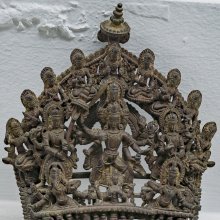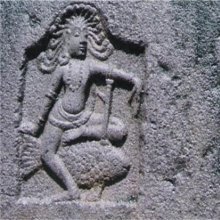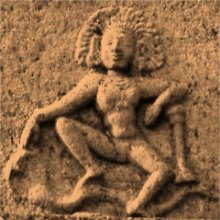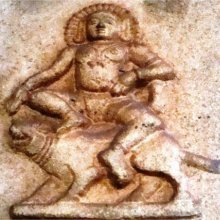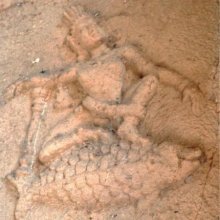Tanta, Tamta, Tāṇṭā, Ṭanṭā: 17 definitions
Introduction:
Tanta means something in Hinduism, Sanskrit, Buddhism, Pali, Marathi, Jainism, Prakrit, Hindi, biology, Tamil. If you want to know the exact meaning, history, etymology or English translation of this term then check out the descriptions on this page. Add your comment or reference to a book if you want to contribute to this summary article.
Images (photo gallery)
(+48 more images available)
Biology (plants and animals)
Source: Google Books: CRC World Dictionary (Regional names)Tanta in India is the name of a plant defined with Elettaria cardamomum in various botanical sources. This page contains potential references in Ayurveda, modern medicine, and other folk traditions or local practices It has the synonym Zingiber minus Gaertn. (among others).
Example references for further research on medicinal uses or toxicity (see latin names for full list):
· Revisio Generum Plantarum (1891)
· Les Figures des Plantes et Animaux d'Usage en Medecine (1764)
· Transactions of the Horticultural Society of London (1812)
· Flora Peruviana, et Chilensis (1798)
· Verhandelingen van het Bataviaasch Genootschap van Kunsten en Wetenschapen (1830)
· Botanico-Medica
If you are looking for specific details regarding Tanta, for example extract dosage, pregnancy safety, side effects, diet and recipes, chemical composition, health benefits, have a look at these references.

This sections includes definitions from the five kingdoms of living things: Animals, Plants, Fungi, Protists and Monera. It will include both the official binomial nomenclature (scientific names usually in Latin) as well as regional spellings and variants.
Languages of India and abroad
Pali-English dictionary
Source: BuddhaSasana: Concise Pali-English Dictionarytanta : (nt.) thread; string; a loom.
Source: Sutta: The Pali Text Society's Pali-English DictionaryTanta, (nt.) (Vedic tantra, to tanoti; cp. tantrī f. string) a thread, a string, a loom J. I, 356 (°vitata-ṭṭhāna the place of weaving); DhA. I, 424. At J. IV, 484 tanta is to be corrected to tata (stretched out).

Pali is the language of the Tipiṭaka, which is the sacred canon of Theravāda Buddhism and contains much of the Buddha’s speech. Closeley related to Sanskrit, both languages are used interchangeably between religions.
Marathi-English dictionary
Source: DDSA: The Molesworth Marathi and English Dictionarytaṇṭā (तंटा).—m ( H) A quarrel, dispute, difference. 2 (Laxly.) A troublesome and a necessary business; urgency of creditors or other claimants; any unpleasant affair.
--- OR ---
tanta (तंत).—f (tantu S) A thread, a string, a wire, a chord of a musical instrument. tantī prāṇa uraṇēṃ-lāgaṇēṃ g. of s. To be at the last gasp. 2 fig. To be very decayed or old--a thing.
--- OR ---
tanta (तंत).—ad (tata S) Correspondently with; answeringly or agreeingly with; in exact equality or likeness (with some standard). v bhara, utara. 2 Up to the full measure or capacity of, brimful. 3 Precisely, exactly, just. Ex. bārā tanta vājalyā. 4 also tanta- tanta or tantavitanta ad In concord or unison, harmoniously. Ex. tantatanta vitanta ghana susvara || vājavita vā- dyāñcā gajara ||. Note tanta vitanta in this example are by some interpreted as signifying Stringed and not stringed; consisting of chords and not consisting of chords;--used of musical instruments. (From tata S Stringed.)
--- OR ---
tāṇṭa (तांट).—n A living plant or stalk (of jōndhaḷā, bājarī &c.) 2 A mere stalk or culm of it. 3 A gold coin (valuing about 5 rupees). Used with putaḷīcēṃ preceding similarly with tāṭa q. v. infra.
--- OR ---
tānta (तांत).—f (tantu S) A fibre or thread; a chord or wire; a piece of catgut &c. tāntīṃ prāṇa uraṇēṃ-dharaṇēṃ &c. To be in articulo mortis. tāntīṃ sutīṃ dharaṇēṃ To bring under the rein; to take in hand in order to break in or train (a horse, bullock &c.)
Source: DDSA: The Aryabhusan school dictionary, Marathi-Englishtaṇṭā (तंटा).—m A quarrel, dispute. Urgency of creditors.
--- OR ---
tanta (तंत).—ad Correspondently with. Exactly. Brimful. f A thread. tantī prāṇa uraṇēṃ To
--- OR ---
tāṇṭa (तांट).—n A living plant or stalk. A mere stalk. A gold coin.
--- OR ---
tānta (तांत).—f A wire; a fibre. tāntīṃ prāṇa uraṇēṃ To be in articulo mortis or on the point of death. tāntīṃ sutīṃ dharaṇēṃ To take in hand in order to break in or train.
Marathi is an Indo-European language having over 70 million native speakers people in (predominantly) Maharashtra India. Marathi, like many other Indo-Aryan languages, evolved from early forms of Prakrit, which itself is a subset of Sanskrit, one of the most ancient languages of the world.
Sanskrit dictionary
Source: DDSA: The practical Sanskrit-English dictionaryTānta (तान्त).—p. p. [tam-kta]
1) Wearied, languid, fatigued; सविलासरतान्ततान्तमूर्वोर्विवरे कान्तमिवाभिनीय शिश्ये (savilāsaratāntatāntamūrvorvivare kāntamivābhinīya śiśye) Bu. Ch.5.56.
2) Troubled, afflicted.
3) Faded, withered; मृदुलतान्त- लता तमलोकयत् (mṛdulatānta- latā tamalokayat) Śi.; see तम् (tam).
--- OR ---
Tānta (तान्त).—See under तम् (tam).
Source: Cologne Digital Sanskrit Dictionaries: Shabda-Sagara Sanskrit-English DictionaryTānta (तान्त).—mfn.
(-ntaḥ-ntā-ntaṃ) 1. Wearied, fatigued, distressed. 2. Languid, languishing. 3. Faded, withered, blighted. E. tam to be distressed, affix kta.
Source: Cologne Digital Sanskrit Dictionaries: Monier-Williams Sanskrit-English Dictionary1) Tānta (तान्त):—1. tānta m. ‘end of ta’, a mystical Name of the letter th, [Rāmatāpanīya-upaniṣad i, 78.]
2) 2. tānta mfn. (√tam) breathing with difficulty, fainted away, languishing, drooping, [Taittirīya-brāhmaṇa ii, 3, 8, 1; Śatapatha-brāhmaṇa iv, 2, 2, 11]
3) languid (the eye), [Amaru-śataka]
4) wearied, fatigued, distressed, [Horace H. Wilson]
5) faded, [Horace H. Wilson]
Source: Cologne Digital Sanskrit Dictionaries: Yates Sanskrit-English DictionaryTānta (तान्त):—[(ntaḥ-ntā-ntaṃ) a.] Wearied; faded.
Source: DDSA: Paia-sadda-mahannavo; a comprehensive Prakrit Hindi dictionary (S)Tānta (तान्त) in the Sanskrit language is related to the Prakrit word: Taṃta.
[Sanskrit to German]
Sanskrit, also spelled संस्कृतम् (saṃskṛtam), is an ancient language of India commonly seen as the grandmother of the Indo-European language family (even English!). Closely allied with Prakrit and Pali, Sanskrit is more exhaustive in both grammar and terms and has the most extensive collection of literature in the world, greatly surpassing its sister-languages Greek and Latin.
Hindi dictionary
Source: DDSA: A practical Hindi-English dictionaryTanta in Hindi refers in English to:—(nm) wrangling; altercation; quarrel; encumbrance; botheration; used as the second member in the compound [jhagada- tamta] (see); ~[tebaja] querulous; prone to wrangle or altercate; hence ~[baji] (nf)..—tanta (टंटा) is alternatively transliterated as Ṭaṃṭā.
...
Prakrit-English dictionary
Source: DDSA: Paia-sadda-mahannavo; a comprehensive Prakrit Hindi dictionary1) Taṃta (तंत) in the Prakrit language is related to the Sanskrit word: Tantra.
2) Taṃta (तंत) also relates to the Sanskrit word: Tānta.
Prakrit is an ancient language closely associated with both Pali and Sanskrit. Jain literature is often composed in this language or sub-dialects, such as the Agamas and their commentaries which are written in Ardhamagadhi and Maharashtri Prakrit. The earliest extant texts can be dated to as early as the 4th century BCE although core portions might be older.
Kannada-English dictionary
Source: Alar: Kannada-English corpusṬāṃta (ಟಾಂತ):—[noun] the fact of a sound or word ending with the consonant sound 'ಟ'.
--- OR ---
Tāṃta (ತಾಂತ):—
1) [adjective] tired; fatigued.
2) [adjective] not working; not busy; inactive; idle.
3) [adjective] withered; languished; not having freshness.
--- OR ---
Tāṃta (ತಾಂತ):—[noun] a word that ends with the sound 'ತ'.
Kannada is a Dravidian language (as opposed to the Indo-European language family) mainly spoken in the southwestern region of India.
Tamil dictionary
Source: DDSA: University of Madras: Tamil LexiconTaṇṭā (தண்டா) noun < Urdu taṇṭā.
1. Difficulty, mischief, vexation; தொந்தரை. [thontharai.] Local usage
2. Dispute, squabble; சண்டை. [sandai.] Local usage
3. Puzzle, intricacy, trammel; சிக்கல். [sikkal.] Local usage
4. Iron bar used in bolting a door; கதவையடைத்து இடும் இருப்புத்தடி. [kathavaiyadaithu idum irupputhadi.] Tinnevelly usage
--- OR ---
Taṇṭā (தண்டா) noun < Telugu daṇḍemu < daṇḍa. See தண்டால். [thandal.] Local usage
--- OR ---
Tāṇṭā (தாண்டா) noun perhaps from Marathi dāṇḍā. A flower-garland worn on braided hair by woman; மகளிர் தலைப்பின்னலில் அணியும் மாலை. [magalir thalaippinnalil aniyum vaithiya malaiyagarathi] Local usage
Tamil is an ancient language of India from the Dravidian family spoken by roughly 250 million people mainly in southern India and Sri Lanka.
See also (Relevant definitions)
Starts with (+133): Tamtalamari, Tamtalu, Tamtalumari, Tamtalumaritana, Tamtam, Tamtanisu, Tamtavaga, Tantabakheda, Tantabhanda, Tantacam, Tantacarukkarai, Tantacatam, Tantaccippu, Tantaccoru, Tantacikamaram, Tantacirai, Tantaciram, Tantacukam, Tantacukan, Tantada.
Ends with (+82): Acchatanta, Acyutanta, Ajivitanta, Anantanta, Antanta, Anuttamta, Apatanta, Aranabhidrishtamta, Atamta, Atitanta, Atmavrittanta, Avatanta, Bahuvrittanta, Bhotanta, Bhottamta, Bhugolavrittanta, Bhuvanavattanta, Bhuvanavrittanta, Candarudrashishyadrishtanta, Cilatiputradrishtanta.
Full-text (+70): Danda, Thanda, Tantanta, Tantamunta, Nitantam, Danda-thor, Nitanta, Tantakkaran, Dhanda, Tam, Tapputtanta, Muka Danda, Udyoga-dhanda, Nitantarakta, Nitantakathina, Nitantavrikshiya, Danda thuar, Danda chindi, Tantra, Tantha.
Relevant text
Search found 49 books and stories containing Tanta, Tamta, Tāṇṭā, Ṭanṭā, Taṇṭā, Tāṇṭa, Tānta, Taṃta, Ṭāṃta, Ṭānta, Ṭānṭa, Tāṃta, Thanda, Thandaa, Danda, Dhanda, Thaandaa; (plurals include: Tantas, Tamtas, Tāṇṭās, Ṭanṭās, Taṇṭās, Tāṇṭas, Tāntas, Taṃtas, Ṭāṃtas, Ṭāntas, Ṭānṭas, Tāṃtas, Thandas, Thandaas, Dandas, Dhandas, Thaandaas). You can also click to the full overview containing English textual excerpts. Below are direct links for the most relevant articles:
Sahitya-kaumudi by Baladeva Vidyabhushana (by Gaurapada Dāsa)
Text 8.22 < [Chapter 8 - Literary Qualities]
The Garuda Purana (by Manmatha Nath Dutt)
Chapter XIX - The Garudi Vidya which is the cure for all kinds of snake-bite < [Agastya Samhita]
Chapter CXXVI - Visvedeva Puja < [Brihaspati (Nitisara) Samhita]
Chaitanya Bhagavata (by Bhumipati Dāsa)
Verse 1.4.39 < [Chapter 4 - Name-giving Ceremony, Childhood Pastimes, and Thieves Kidnap the Lord]
Historical Elements in the Matsya Purana (by Chaitali Kadia)
Position of Purāṇas in the Sanskrit Literature < [Chapter 1 - An Introduction of the Purāṇas]
Foreign policy strategies < [Chapter 5 - Cultural history in the Matsya-Purāṇa]
Mahabharata (English) (by Kisari Mohan Ganguli)
Related products
